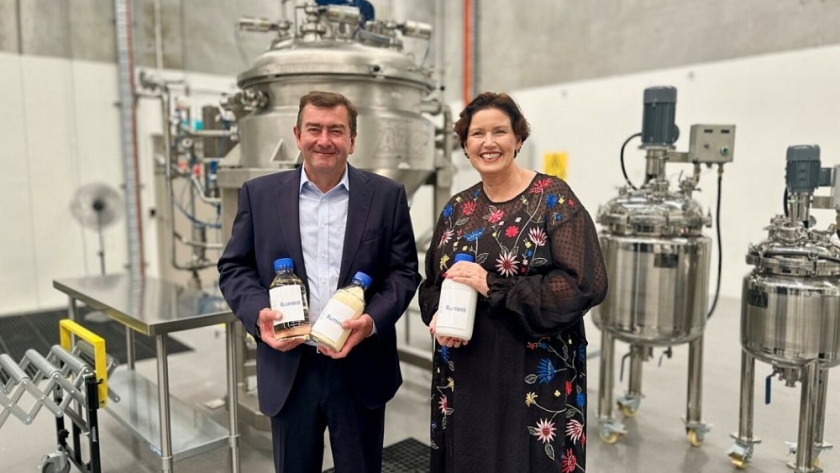
By Agroempresario.com
In recent weeks, livestock methane reduction has been in the spotlight for all the wrong reasons, especially with a surge of misinformation surrounding feed supplement Bovaer (3-NOP). This raises questions about other “chemical-sounding” solutions in the field. Australian startup Rumin8, which produces feed supplements containing bromoform (a compound also found in the red seaweed Asparagopsis), has recently gained approval from Brazil’s Ministry of Agriculture, Livestock, and Food Supply, following provisional registration in New Zealand.
David Messina (DM), Rumin8’s cofounder and CEO, spoke with AgFunderNews (AFN) about why he believes synthetic chemistry is the most cost-effective path to methane reduction, contrasting it with seaweed, plant extracts, and biomanufacturing solutions.
DM: Growing up on a farm in Western Australia, I pursued an ag science degree and was always drawn to new technologies. After working in biofuels and various startups, the methane reduction challenge in agriculture caught my attention. My cofounder, Dr. Stewart Washer, and I started exploring the potential of Asparagopsis seaweed, which showed promise in reducing methane emissions. Stewart suggested we investigate if we could manufacture and stabilize the compound to make it cheaper and more scalable than growing vast amounts of seaweed.
DM: We realized that we could stabilize tribromomethane (TBM), or bromoform, a key bioactive compound in the seaweed, and deliver it in multiple formats. This allows us to provide a solution for grass-fed cattle, as most global cattle are not in feedlot systems. For example, in Australia, cattle are often grazing on low-quality grass and range land. Our aim was to provide solutions that work in these environments.
Stabilizing TBM has been a challenging process. It took us four years and millions of dollars to achieve a stable form that can be delivered in very low doses, resulting in over 90% reductions in methane emissions. Alongside methane reduction, we’re also seeing productivity gains.
DM: While TBM isn’t a new compound, the novelty lies in how we stabilize and deliver it safely to animals. We manufacture in both Australia and the US for trial purposes, and we are still a couple of years away from our first commercial sales. The product will meet pharmaceutical-grade standards, meaning it will undergo stringent regulation by bodies such as the FDA.
DM: Bromoform requires substantial effort to stabilize and deliver it effectively. If a study didn’t show good results, it’s likely because it wasn’t delivered in an optimized form. Our stabilized bromoform is a well-developed product, and if it didn’t work, we wouldn’t have a business.
DM: In feedlot environments, we’ve consistently achieved over 85% methane reductions. Our target is to maintain that level long-term. We’ve conducted 24 trials globally, with another 10 planned in the next 12-18 months. In addition to methane reductions, we’ve seen productivity gains of 5-10%.
DM: The product must be profitable for farmers, as this will drive widespread adoption. In regions with carbon credits, like the EU, farmers can also benefit financially from reduced emissions. However, the product needs to be affordable, and that’s where productivity gains and lower carbon footprints play a key role.
DM: We’ve conducted extensive safety testing and submitted our findings to regulators globally. We’ve secured provisional approval in New Zealand and licensed our product in Brazil. Regulators are becoming more comfortable with our product’s safety for animals and humans, and we’re confident in its controlled delivery.
DM: Since we’re using a chemical process, we can scale production quickly with existing GMP facilities, needing minimal modifications.
DM: We’ve raised $18 million from investors, including Breakthrough Energy Ventures, who were impressed with the scalability and low cost of our product. Our solution works for a broad range of animals, not just those in feedlots or dairies.
DM: Our target is 2026, but regulatory timelines will drive this process.
DM: Being a regulated product requires significant investment in trials to meet various requirements, which is challenging for a startup. However, once we receive regulatory approvals, the market will have confidence in the product.
DM: The processors—meat or milk producers—are key to starting the conversation, as they are in constant contact with farmers. However, the product’s profitability for farmers is essential for widespread adoption. Without their support, the solution won’t be effective.
